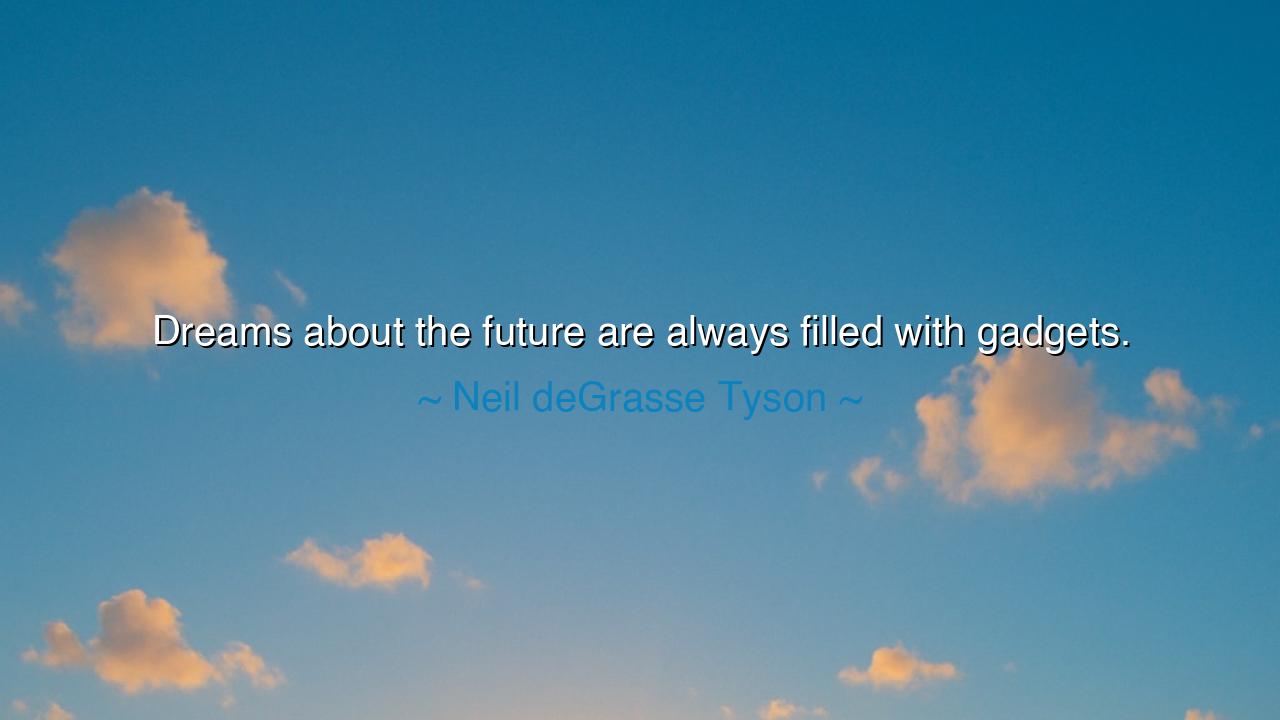
Dreams about the future are always filled with gadgets.






On the Machinery of Dreams and the Spirit of Human Invention
When Neil deGrasse Tyson, the modern philosopher of the cosmos, said, “Dreams about the future are always filled with gadgets,” he spoke not only as a scientist, but as a keeper of humanity’s eternal flame — the yearning to create, to build, and to imagine worlds beyond the horizon of the known. His words are both observation and revelation: that when humankind dreams of tomorrow, it dreams not of rest or stillness, but of invention — of gadgets, of tools, of wondrous contraptions born from the restless heart of discovery. In this truth lies both our glory and our burden: for the instruments we fashion reflect not only our genius, but our unending hunger to transcend our limits.
Since the dawn of civilization, man’s dreams of the future have been tied to the tools of his making. When the ancients looked ahead, they saw not visions of still simplicity, but chariots that could fly, ships that could brave the stars, and engines that could move mountains. In every age, the gadget — the device, the invention, the creation — has been the vessel of human hope. The plow transformed hunger into harvest; the compass turned fear into exploration; the printing press gave wings to thought. And so it has been through time: when we imagine what is to come, we see the instruments that will take us there, glowing in the forge of our imagination.
Tyson’s insight captures this essence — that technology is not merely metal and wire, but the physical expression of our dreams. The gadget is the bridge between thought and reality, between desire and destiny. It is the manifestation of our longing to master nature and to understand it. Yet, in his words, there is also a subtle challenge: if all our dreams are filled only with machines, what of the soul that wields them? The gadgets of the future may soar higher and think faster than we, but will they also teach us wisdom, compassion, or balance? Tyson’s observation invites not only admiration for invention, but reflection upon what kind of future we are dreaming into being.
History is filled with examples that illuminate both the wonder and the peril of this truth. Consider the story of Leonardo da Vinci, whose notebooks overflowed with visions of flying machines, armored vehicles, and intricate mechanical marvels. His mind was centuries ahead of his time, his dreams crowded with “gadgets” that the world would not see for hundreds of years. Yet Leonardo did not invent for greed or conquest; he invented for curiosity — for the sheer joy of exploring the possibilities of human potential. His sketches, though simple lines on paper, were seeds of tomorrow, planted in the soil of imagination.
But contrast this with the 20th century, when humanity’s greatest technological triumph — the splitting of the atom — became both a source of boundless energy and a weapon of terrible destruction. The gadget that lit the stars also lit the fires of Hiroshima. In this we see the double edge of invention: that progress without wisdom can birth not utopia, but ruin. Tyson’s quote, though playful on its surface, hides a warning worthy of the ancients: that in our pursuit of cleverness, we must not lose our conscience. For the tools we build reflect the hearts that wield them — and the dream of a better world cannot live in the hands of those who forget what “better” truly means.
Thus, to dream of the future is to gaze into the mirror of our own desires. If our dreams are filled only with gadgets, then the future will be made of devices — clever, cold, efficient. But if we fill our dreams with wisdom, kindness, and wonder, then those gadgets will serve humanity rather than dominate it. The machine, after all, is not our master but our servant; it is an extension of our will. It can lift us to the stars or drag us into shadow — the choice is ours.
The lesson, then, is this: let your inventions be guided by conscience, and your progress by purpose. Do not dream merely of tools, but of the world those tools will build. When you imagine the future, ask not only, What can we create? but Why should we create it? Let your “gadgets” — whether of metal, code, or thought — be born of reverence for life, for the Earth, and for one another.
In the end, Neil deGrasse Tyson’s words remind us that dreaming of the future is both our gift and our responsibility. To dream with imagination is the nature of humankind; to dream with wisdom is its destiny. So when your mind fills with visions of invention and progress, remember: it is not the gadget that defines the dream, but the dreamer. The tools of tomorrow are only as noble as the hearts that shape them. Therefore, dream boldly — but dream with love, for only then will our gadgets become instruments not of vanity, but of light.






AAdministratorAdministrator
Welcome, honored guests. Please leave a comment, we will respond soon